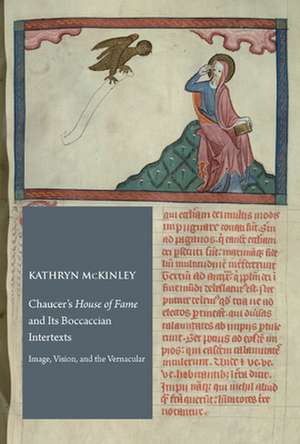Chaucer's "House of Fame" and Its Boccaccian Intertexts
Autor Kathryn McKinleyen Limba Engleză Hardback – 12 dec 2016
Preț: 504.72 lei
Preț vechi: 593.80 lei
-15% Nou
Puncte Express: 757
Preț estimativ în valută:
96.59€ • 98.92$ • 80.35£
96.59€ • 98.92$ • 80.35£
Carte indisponibilă temporar
Doresc să fiu notificat când acest titlu va fi disponibil:
Se trimite...
Preluare comenzi: 021 569.72.76
Specificații
ISBN-13: 9780888442062
ISBN-10: 0888442068
Pagini: 256
Dimensiuni: 163 x 234 x 23 mm
Greutate: 0.57 kg
Editura: PIMS
ISBN-10: 0888442068
Pagini: 256
Dimensiuni: 163 x 234 x 23 mm
Greutate: 0.57 kg
Editura: PIMS
Notă biografică
Kathryn McKinley, Associate Professor of English at the University of Maryland, Baltimore County, received her MA in Classics from the University of Toronto, and her doctorate in English from the University of Delaware. Her research and teaching interests include medieval Latin, Ovid, and Chaucer, and extend to the materiality of devotional practices in late medieval England, agency in medieval art, and the relation between art and pilgrimage. She is the author of Reading the Ovidian Heroine: "Metamorphoses" Commentaries, 1100-1618 (Leiden, 2001) and co-editor, with James G. Clark and Frank T. Coulson, of Ovid in the Middle Ages (Cambridge, 2011). Her articles have appeared in Chaucer Review, Viator, and English Manuscript Studies, 1100-1700.
